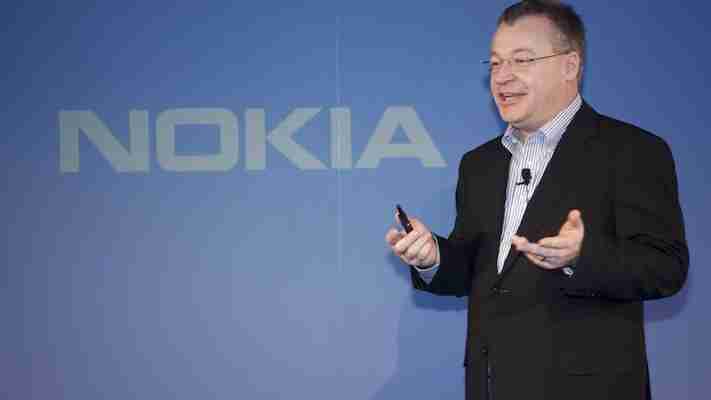Nokia is set to unveil on Wednesday a new line of Lumia smartphones running Microsoft’s Windows Phone 8 tomorrow, and TNW will have live coverage of the launch. If the numerous leaks haven’t been enough for you, go straight to the source with The Wall Street Journal’s interview with Nokia CEO Stephen Elop where he teases some of what’s coming.

The Finnish handset-maker is holding its September 5 launch event in New York City. So far, it looks like we’ll see the Lumia 820 and 920 phones. The Lumia 920 will likely be branded with the PureView label, though it isn’t expected to have exactly the same optics as the 41-megapixel Nokia 808 PureView. Additional leaks have also hinted at a wireless charging setup and matching bluetooth headsets.
In the interview, Elop said Nokia and Microsoft have to establish Windows Phone as “the third viable ecosystem” because Google and Apple are already “very strong.” He highlighted Nokia’s unique background as an opportunity to differentiate itself from other Windows Phone 8 device makers, such as Samsung or possibly HTC .
“What you will see as we introduce our next collection of devices is not only all of the Windows Phone 8 capability that all of the manufacturers will be taking advantage of, but you’ll see some very obvious, distinct Nokia capabilities in our devices that you will not see anywhere else. Without saying too much about it on the night before, there’s clearly some exciting things coming that we’re going to be very proud to show off.”
When asked how Nokia’s new lineup will stand up to Apple’s upcoming next-gen iPhone , Elop said the new experiences on the devices will “break through” when consumers see them.
Elop concluded by saying that these are the first Nokia devices that will demonstrate “the full power and might of the Nokia R&D teams” on Windows Phone.
“So some of the things that you’ll see tomorrow you’ll look at and you’ll say wow this has clearly been years in the making, it’s wonderful work. This is the type of thing that Nokia has always been known for and we’re need to get more of that out there,” he said.
Tune in to TNW on Wednesday (aka later today for those of you outside of North America) to find out what that “wonderful work” looks like.
Image Credit
Amazon rumoured to launch two new 7-inch Kindle Fires, one of them ad-supported
Online retail giant Amazon looks set to disrupt the tablet market in the coming days when it announces the launch of an ad-supported Kindle Fire, taking a strategy that has worked well with its range of e-readers and adapting it for the personal computing market.

Reports of a subsidised tablet device come from the Wall Street Journal (WSJ) , which states that Amazon will price a particular tablet model lower than its counterparts, displaying selected advertisements when the user wakes the gadget from its locked state.
If a new report from Cnet is also to be believed, Amazon will not attempt to compete against Apple with a 10-inch tablet of its own. Instead, the company is said to be readying the launch of two new 7-inch models, one which will be a slight iteration of the existing Kindle Fire model and the other sporting more drastic hardware improvements.
Cnet’s Roger Cheng and Steven Musil write:
Cnet’s sources lend credibility to an ad-supported tablet, which could trade in powerful hardware features for a more affordable and marketable consumer device.
Tablet vendors have found it increasingly hard to compete with Apple’s iPad, which typically accounts for seven of every ten tablets sound worldwide. This resulted in Google undercutting its competition on price with the launch of the Nexus 7 andAmazon could be about to lower that pricing barrier yet further with a tablet that can offset part of its manufacturing cost by displaying targeted advertisements.
The original Kindle Fire was rumoured to be sold at cost price or at a minor loss, with Amazon able to recoup lost revenue on value-added services such as Kindle books, apps and music downloads. The company reportedly sold over 5 million Kindle Fire’s and almost certainly showed Google that the pricing model has its merits.
Amazon has shaved $30 to $50 off Kindles that ranged from $109 to $189 over the past 18 months. While adverts are displayed the minute the reader was woken from its sleeping state, Amazon did not force them on users when they were reading books.
If Amazon is to deliver ads on its new Kindle Fire variant, it looks set to be the first major vendor to utilise an ad-supported model to sell tablet devices to the mass market.
It’s a bold strategy. TNW’s Emil Protalinski argued that Kindle Fire 2 is going to have an even tougher job than its predecessor. Instead of having no real competitors in the space, a next-generation Kindle Fire will have two very solid competitors in Google and Apple.
“Amazon better have something great planned, or the Kindle Fire will go from the disruptor to the disrupted,” he said. Maybe this is it.
Google’s Project Glass is cool, but it raises a number of privacy concerns
Google’s project glass is some crazy-exciting technology. Not since the original iPhone has a device appeared feeling so ahead of it’s time. Potential uses for the wearable tech are straight out of a sci-fi film, but will our cyborg future be as dystopian as those on our movie screens? Plenty of writers and commenters have taken the opportunity to freak out about the possible privacy implications. Are they making a fuss over nothing, or should we really be worried about the potential privacy consequences of having phones strapped to our heads?

Google Glasses will probably use some kind of eye-tracking system to work out what you’re looking at on screen, to control and even to unlock the device . Eye-tracking technology has been around for a long time and is used regularly in all sorts of experiments, but now the fear is that Google could track everything you’re ogling and deduce what you’re interested in. They could see, for example, what kind of cars, even what kind of girls you like, and advertise to you accordingly.
But constantly tracking your eye movements to create a map of what you like is a huge step beyond what we currently share with Google and co. They’d know things about us we don’t even know! It would be like letting Google peer through your webcam to work out when your getting bored online and react accordingly, a step too far that no-one would put up with. People won’t be jumping at the chance to pay hundreds of dollars for the privilege of Google sucking unconscious brain data out of their eye-sockets, so there’s no way this one’s gonna happen.
This fear is based on the idea that your always-on glasses will be constantly informing the Google mothership where you are at all times and will advertise accordingly. The sorts of horrific advert opportunities hypothesised here include alerts popping up to tell you when you’re near a coffee branch with a special offer available. This could already happen on our phones, but people wouldn’t put up with it — so they sure as hell wouldn’t put up with it flashing in front of their face. Of course, adverts are pretty intrusive already. Facebook regularly mocks me with the old ’23 and still single?’.
But Google isn’t going to be shoving pop-ups in your face as you walk down the street. Any ads would have to be on the periphery of your vision, and would suffer from the same monetization issues as mobile advertising thanks to the small screen real estate on offer.
A phone strapped to the side of your head with a camera would know more about you than your phone does now, but not much more. Google already collects oodles of data about you, making money off it with targeted ads and even going so far as to customise your news search results to your political biases and creating what one guy dubbed the ‘ The Daily Me ‘.
Even if Google gets tonnes more data about you, they’ll still have to be seriously careful what they do with it. The current business model only works because most people trust them. The deal is, we use their free services, and they anonymously sell that data in the form of targeted advertising, while promising not to do anything “evil” with the data. As soon as public trust begins to erode, their business model goes down the crapper. Google have to tread carefully with our data, or we will stop giving it to them.
The media jumps on Google every time they mess up, and rightfully so. Google was recently forced by the FTC to pay a record $22.5 million fine to settle allegations that it broke privacy promises by secretly tracking millions of users of Apple’s iPhone Safari browser. Similarly, a storm erupted when it was discovered that Google street view cars had been secretly farming wi-fi data from houses and businesses. Sure, you could argue this shows a dark side to Google, proving they can’t be trusted with something like Google Glass. But it’s not in Google’s interest to be naughty, and there are already signs that privacy scares like these and others have done damage to the Google business model.
A new study entitled “Privacy and Data Management on Mobile Devices,” by the Pew Research Centre, found that nearly 20% of adults mobile phone users in the US say they’ve deliberately switched off the location tracking feature on their phone because they were worried that other people or a company could obtain their location. And the worst part for Google? Smartphone users are the most active in safeguarding their privacy, with one third reporting they disabled the tracking feature.
These are the very people who Google is hoping will really get into giving over all their info but – as far as location tracking goes, at least – they are also the most tech savvy and paranoid. Of course, even the people who turn off their tracking features probably still have a huge amount of data on Google’s servers; browser cookies, Gmail, maybe even Google+. Even so, if privacy fears gain momentum, Google have more PR disasters, or do anything “evil” with our data then the trend present in this study could pose a serious challenge to their access to our data.
The stalky idea of being able to see a Facebook profile floating above everyone’s heads would be cool and terrible — and bring a new meaning to the word frape . With regards to law enforcement, especially the FBI, well, that may be a different story and it may not be long before we get our first accidental shooting because an app strapped to an officer’s head told him the wrong guy is armed and dangerous.
Admittedly, this one’s pretty creepy — but not gonna happen anytime soon. Think of the trouble still brewing over pretty useful but tame facial recognition software and you’ll realise Google aren’t going to be adding this sort of functionality to Project Glass anytime soon.
Are these glasses cool enough for people to wear all day? Yes, people thought the first businessmen with mobile phones were complete douches, but we’re talking about glasses here. Glasses have always been associated with nerdiness and adding technology isn’t going to make them cooler. Just take the example of the guy attacked by McDonald’s staff in Paris for wearing his own Google Glass-style augmented reality shades. Can Google really convince everyone to walk around with their Über-nerd glasses on all day? I’m not so sure.
I may well be wrong — all these things and more could happen and we might all wind up being cool with it, like we are with the current status quo. The glasses situation comes down to each of us deciding how much is too much sharing and when we’ve finally lost too much privacy. Google, Facebook and others will try to keep our trust, while gradually convincing us to share ever more data and continue to erode our privacy.
Ask someone from the 90s if they would be happy with how much personal information is on nameless servers today and you’d get a resounding ‘hell no!’. CNET’s Elinor Mills pointed out that when Google announced Gmail in 2004, complete with contextual ads, there was a big old fuss with ‘more than 30 civil liberties groups’ urging google to suspend Gmail. Since then Google have abused our information only enough to remain in our good books and continue feeding on user trust.
As it stands, we’re headed towards more sharing and more implied trust, but hopefully the need to keep our trust will keep Google in check.
Follow today’s latest Google news right now at TNW Google .
